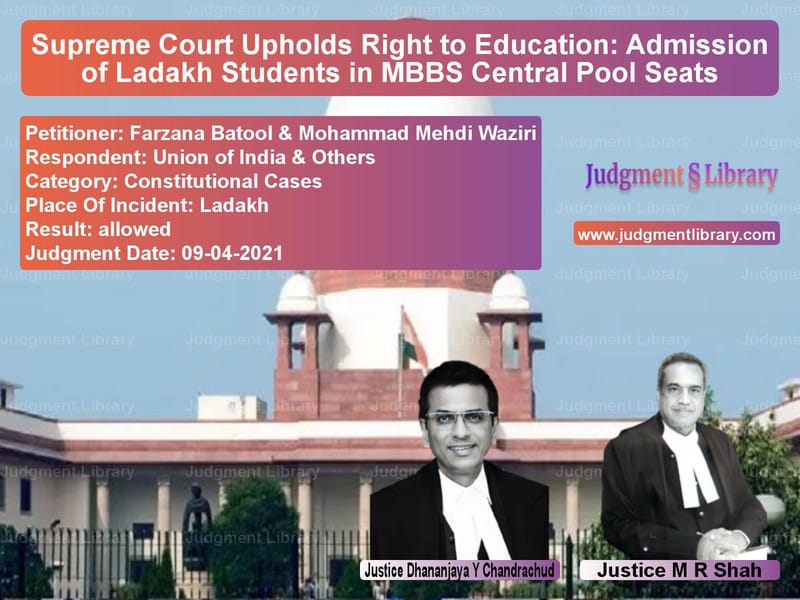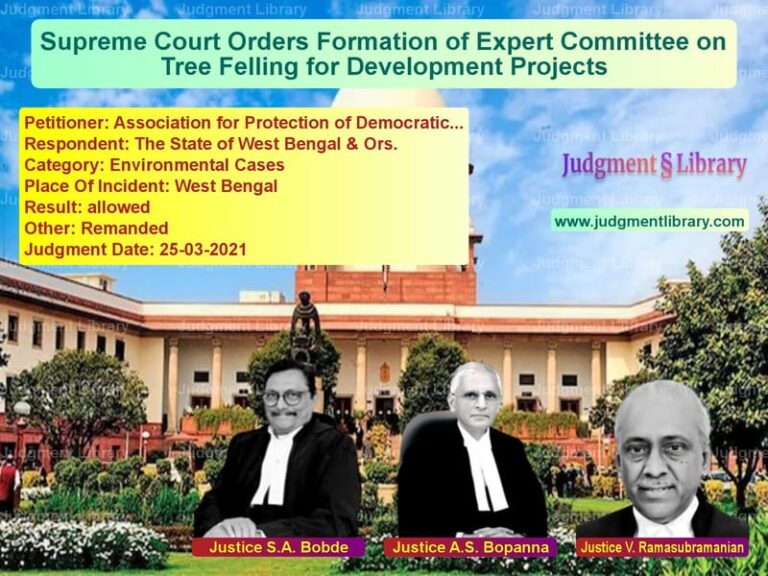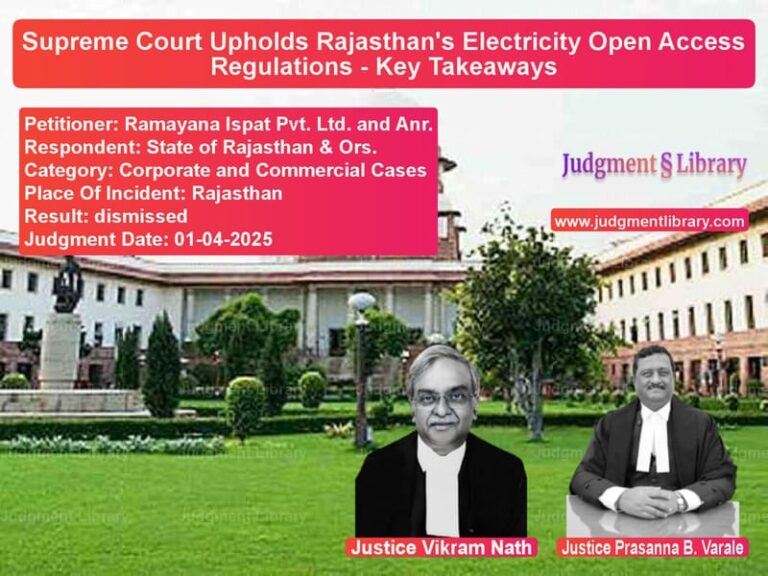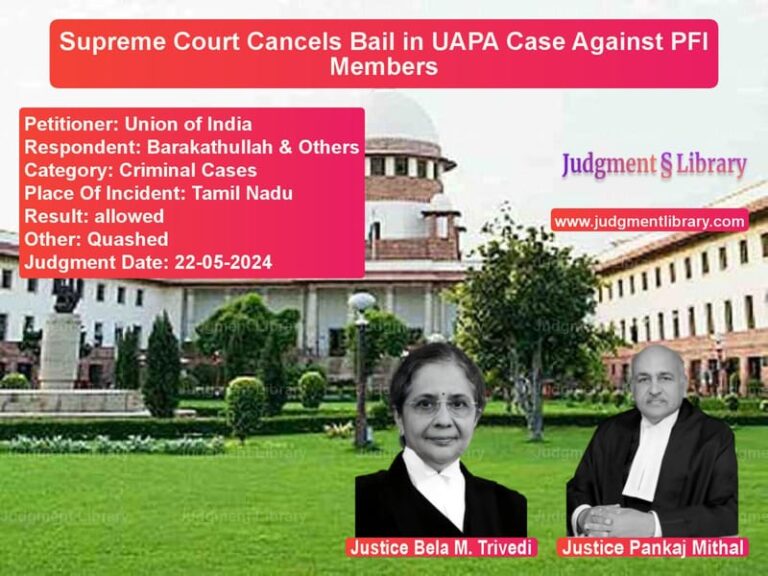Supreme Court Upholds Right to Education: Admission of Ladakh Students in MBBS Central Pool Seats
The Supreme Court of India recently delivered an important judgment in Farzana Batool v. Union of India, addressing the right to education for students from Ladakh. The case involved two students who were nominated for admission under the central pool MBBS seats but were denied admission despite their valid nominations. The Court’s intervention ensured that the students were granted admission and also laid down systemic guidelines to prevent similar issues in the future.
Background of the Case
The petitioners, Farzana Batool and Mohammad Mehdi Waziri, are students from Ladakh who were nominated by the Administration of the Union Territory of Ladakh for MBBS seats in the Central Pool for the academic year 2020-2021. Farzana Batool was allotted a seat at Lady Hardinge Medical College (LHMC), and Mohammad Mehdi Waziri was assigned a seat at Maulana Azad Medical College (MAMC). Despite being nominated through the proper channels, their admission was not confirmed by the respective institutions.
The students approached the Supreme Court under Article 32 of the Constitution, seeking directions to ensure their admission, arguing that their fundamental right to education was being violated.
Key Issues Raised
- Whether the denial of admission to the petitioners violated their fundamental rights under Article 14 (Right to Equality) and Article 21 (Right to Life, including the Right to Education).
- Whether the administration of the central pool MBBS seats was being conducted in a fair and transparent manner.
- What systemic measures should be put in place to prevent similar issues in the future?
Arguments by the Petitioners (Farzana Batool & Mohammad Mehdi Waziri)
- “The Union Territory of Ladakh had officially nominated us for the central pool seats, and we had duly followed all procedures, yet our admissions were not confirmed.”
- “Other students from Ladakh, who were similarly nominated, had their admissions confirmed, while we were unfairly denied admission without any valid reason.”
- “The denial of admission has caused immense mental and emotional stress, impacting our future careers in medicine.”
Arguments by the Respondents (Union of India & Administration of Ladakh)
- “The students were duly nominated, and there was no intention to deny them admission.”
- “The administrative delay should not be construed as an intentional act to deprive them of their rights.”
- “We will ensure that all students from Ladakh who were nominated under the central pool will be admitted as per the rules.”
Supreme Court’s Observations on the Right to Education
The Supreme Court took a strong stance on the issue, emphasizing the importance of education and the State’s role in ensuring access to professional education. The Court observed:
- “Access to professional education is not a governmental largesse; instead, the State has an affirmative obligation to facilitate access to education at all levels.”
- “The denial of admission to the petitioners highlights systemic inefficiencies that need to be addressed to prevent similar hardships for other students in the future.”
- “Students from marginalized and remote regions, such as Ladakh, face significant challenges in accessing quality education, and the State must ensure that these obstacles are removed.”
Judgment of the Supreme Court
The Supreme Court ruled in favor of the petitioners and directed:
- The immediate completion of admission formalities for Farzana Batool at LHMC and Mohammad Mehdi Waziri at MAMC within one week.
- All other students listed in the Annexure A of the Ladakh Administration’s Notification dated 19 February 2021 must also be granted admission without delay.
- The Union of India and the Administration of Ladakh must appoint a nodal officer to oversee the admission process for students nominated under the central pool.
- The details of the nodal officer must be widely publicized to ensure transparency and prevent further hardships for students.
Key Takeaways from the Judgment
- Education is a fundamental right: The Supreme Court reinforced that access to higher education, especially professional courses like MBBS, is a right, not a privilege.
- Systemic changes are necessary: The Court went beyond the individual case and mandated structural reforms to prevent future issues in the admission process.
- State responsibility: The government must actively ensure that students from remote areas like Ladakh do not face barriers to education.
- Judicial intervention in educational matters: Courts will step in when there is an arbitrary denial of educational opportunities.
Conclusion
The Supreme Court’s judgment in Farzana Batool v. Union of India sets an important precedent for the protection of students’ educational rights. By ensuring that students from Ladakh were admitted without further delay and mandating systemic changes, the Court reaffirmed its commitment to making education accessible and equitable for all. This case highlights the judiciary’s role in upholding constitutional rights and ensuring fairness in the administration of educational policies.
Petitioner Name: Farzana Batool & Mohammad Mehdi Waziri.Respondent Name: Union of India & Others.Judgment By: Justice Dhananjaya Y Chandrachud, Justice M R Shah.Place Of Incident: Ladakh.Judgment Date: 09-04-2021.
Don’t miss out on the full details! Download the complete judgment in PDF format below and gain valuable insights instantly!
Download Judgment: farzana-batool-&-moh-vs-union-of-india-&-oth-supreme-court-of-india-judgment-dated-09-04-2021.pdf
Directly Download Judgment: Directly download this Judgment
See all petitions in Fundamental Rights
See all petitions in Education Related Cases
See all petitions in Judgment by Dhananjaya Y Chandrachud
See all petitions in Judgment by Mukeshkumar Rasikbhai Shah
See all petitions in allowed
See all petitions in supreme court of India judgments April 2021
See all petitions in 2021 judgments
See all posts in Constitutional Cases Category
See all allowed petitions in Constitutional Cases Category
See all Dismissed petitions in Constitutional Cases Category
See all partially allowed petitions in Constitutional Cases Category







